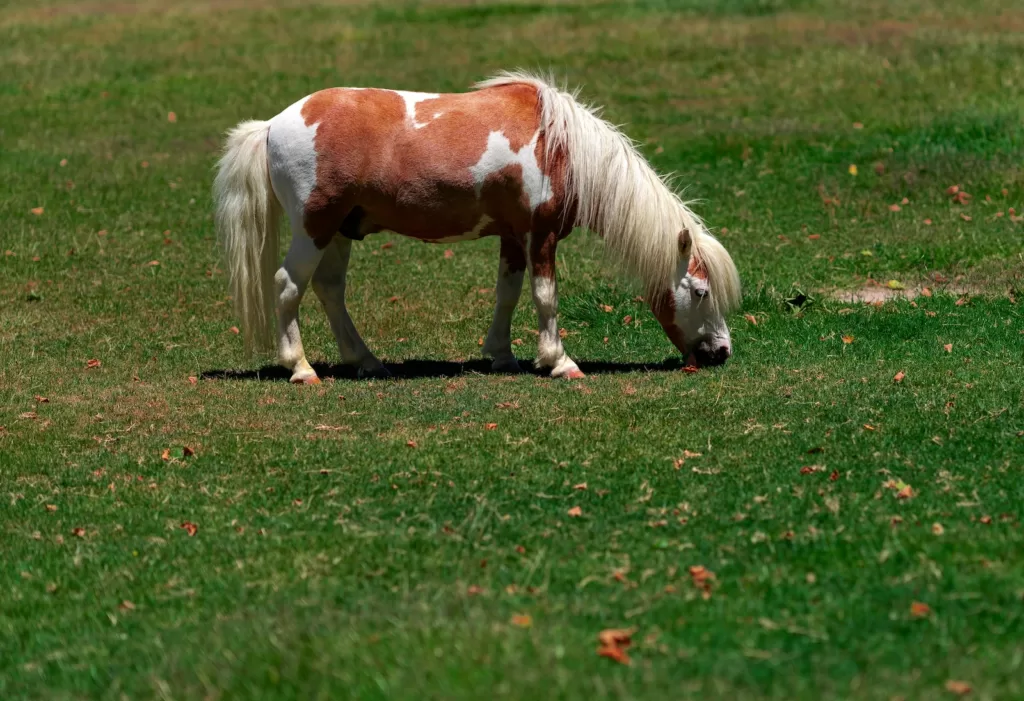How Much Does a Miniature Horse Weigh
Average weight of miniature horses
Miniature horses are small equines that have become increasingly popular as pets, companions, and even therapy animals. These pint-sized equines are not only known for their adorable appearance but also for their relatively low weight. On average, miniature horses weigh between 150 to 350 pounds, depending on various factors.
Factors such as genetics, diet, age, and overall health can contribute to the weight of miniature horses. While some individuals may naturally be heavier or lighter, it is essential for horse owners to monitor their miniature horses’ weight to ensure their well-being. By maintaining a healthy weight, miniature horses can lead active, comfortable lives and minimize the risk of health issues associated with weight gain or loss.
Factors that influence the weight of miniature horses
The weight of miniature horses can be influenced by various factors. One key factor is genetics. Just like with humans, some miniature horses are naturally predisposed to being on the heavier side, while others tend to be more slender. It is important to understand that genetics alone do not determine weight, but they can play a role in influencing the horse’s body composition.
Another factor that impacts weight is diet and nutrition. The type and amount of food a miniature horse consumes can have a significant impact on its weight. Horses that are overfed or have access to high-calorie foods may become overweight or obese. On the other hand, horses that are not receiving enough nourishment may be underweight. Finding the right balance and providing a well-balanced diet is crucial for maintaining a healthy weight in miniature horses.
• Genetics: Some miniature horses are naturally predisposed to being heavier or more slender.
• Diet and nutrition: The type and amount of food a miniature horse consumes can impact its weight.
• Overfeeding: Horses that have access to high-calorie foods may become overweight or obese.
• Undernourishment: Horses that do not receive enough nourishment may be underweight.
• Finding the right balance: Providing a well-balanced diet is crucial for maintaining a healthy weight in miniature horses.
Understanding the size and height of miniature horses
Miniature horses are known for their small size and charming appearances. They are typically no taller than 38 inches and weigh around 150 to 350 pounds. Despite their diminutive stature, miniature horses have a sturdy build and are well-proportioned. Their bodies have a compact frame with well-developed muscles, allowing them to carry weight and participate in various activities.
When it comes to height, miniature horses are measured at the highest point of their withers, which is the area between the shoulder blades. It is essential to note that the height of a miniature horse can vary depending on breed standards. Some may be slightly taller or shorter, but they still retain the same charming characteristics that make them beloved companions and show animals. Understanding the size and height of miniature horses is crucial for horse enthusiasts and owners alike, as it enables them to provide optimal care and tailor their management practices to suit these pint-sized equines.
Comparing the weight of miniature horses with other horse breeds
Miniature horses are unique in their size and weight compared to other horse breeds. While the average weight of a miniature horse can vary depending on factors such as age, height, and genetics, they generally range between 150 to 350 pounds (68 to 159 kilograms). These miniature equines are significantly smaller and lighter than their larger counterparts, making them more ideal for certain activities and purposes.
In comparison, traditional horse breeds, such as Thoroughbreds or Clydesdales, can weigh anywhere from 900 to 2300 pounds (408 to 1043 kilograms) or even more. The stark difference in weight highlights the distinct characteristics and purposes of these different breeds. Miniature horses are often kept as companion animals or used in therapy programs, where their smaller size and weight make them easier to handle and interact with. Conversely, larger horse breeds are typically utilized for riding, racing, or heavy work due to their strength and size. Understanding the weight differences between miniature horses and other breeds can help individuals make informed choices when it comes to selecting the right horse for their specific needs and preferences.
Importance of monitoring the weight of miniature horses
Monitoring the weight of miniature horses is crucial for their overall health and well-being. Just like any other animal, maintaining a healthy weight is essential for miniature horses to thrive and prevent the onset of various health issues. Regularly monitoring their weight allows owners and caretakers to accurately assess if their miniature horse is underweight, overweight, or within the optimal range.
By keeping an eye on their weight, potential problems can be identified early on, ensuring prompt intervention and necessary adjustments to their diet and exercise regimen. Weight fluctuations in miniature horses can indicate underlying health issues such as metabolic disorders, gastrointestinal problems, or nutritional imbalances. By monitoring weight, these conditions can be detected early, allowing for timely veterinary intervention and specialized care. Proactively managing and maintaining a healthy weight in miniature horses greatly contributes to their overall quality of life and longevity.
Tips for assessing the body condition score of miniature horses
A proper assessment of the body condition score is essential in maintaining the overall health and well-being of miniature horses. By visually and physically evaluating the body condition, horse owners and caretakers can determine if their animals are carrying too much weight or are underweight. One key tip for assessing the body condition score is to visually inspect the horse from different angles, looking for signs of either excess fat or prominent bones.
In addition to the visual examination, feeling the horse’s body can provide valuable information about its condition. Palpating the horse’s ribs and backbone can help identify whether they are easily felt or have excessive fat covering. A balanced distribution of fat and muscle is ideal, indicating a healthy weight. By regularly assessing the body condition score, horse owners can make necessary adjustments to the horse’s diet and exercise regime, ensuring their miniature horses maintain an optimal weight for their overall well-being.
Common health issues associated with weight in miniature horses
Obesity is a common health issue observed in many miniature horses. These small equines are often overfed or given excessive amounts of high-calorie feeds, leading to weight gain. The extra pounds can put a strain on their joints and contribute to the development of conditions such as arthritis, laminitis, and metabolic disorders. Moreover, overweight miniature horses may also suffer from respiratory problems, as excess body fat can make it more difficult for them to breathe efficiently.
On the other hand, underweight miniature horses can face a different set of health issues. Insufficient nutrition and improper feeding practices can result in a lack of energy, poor muscle development, and a weakened immune system. These horses may be more susceptible to infections, have difficulty maintaining body temperature, and experience reproductive problems.
Overall, maintaining a healthy weight is vital for the well-being of miniature horses. It is crucial for owners and caretakers to provide proper nutrition, closely monitor their horses’ body condition, and consult with veterinarians for guidance on maintaining an optimal weight for these small equines.
Dietary considerations for maintaining a healthy weight in miniature horses
Proper nutrition plays a crucial role in maintaining a healthy weight in miniature horses. With their small size and unique metabolism, it is important to provide them with a balanced and carefully managed diet. It is essential to understand the specific dietary requirements of these horses and tailor their feeding plan accordingly.
First and foremost, miniature horses should have access to high-quality forage, such as grass hay or pasture. Forage provides essential fiber and promotes proper digestive function. However, it is important to monitor the intake of forage to prevent overeating and excessive weight gain. Miniature horses should also be fed a concentrated feed that is specifically formulated for their nutritional needs. This feed should be designed to provide all the essential nutrients, vitamins, and minerals while keeping the calorie content in check. Feeding guidelines should be followed carefully to prevent under or overfeeding, as both can lead to weight management issues. Additionally, regular monitoring of the horse’s body condition and weight is crucial in adjusting the diet as needed to maintain a healthy weight.
Exercise and activity recommendations for managing weight in miniature horses
Regular exercise and physical activity play a vital role in managing the weight of miniature horses. These small but mighty equines benefit from consistent exercise routines that not only maintain their weight but also promote overall health and well-being. Engaging in regular exercise helps burn calories and fat, preventing weight gain and reducing the risk of obesity-related health issues.
A combination of daily turnout, pasture grazing, and structured exercise is ideal for managing the weight of miniature horses. Providing them with ample time for free movement in a safe and secure environment allows them to engage in natural behaviors that aid in weight management. Additionally, incorporating structured activities such as longeing, driving, or light riding sessions promotes cardiovascular fitness and encourages muscle development. It is important to tailor the exercise regimen to the horse’s individual needs, considering their age, fitness level, and any pre-existing health conditions.
The role of veterinarians in monitoring and managing the weight of miniature horses
Veterinarians play a crucial role in monitoring and managing the weight of miniature horses. These professionals have the knowledge and expertise to assess the body condition score of the horses and determine if they are underweight, overweight, or within a healthy range. By regularly evaluating the weight of miniature horses, veterinarians can identify any potential health issues that may arise from improper weight management.
In addition to monitoring, veterinarians also provide guidance on managing the weight of miniature horses. They may recommend dietary considerations such as adjusting the horse’s feed ration to ensure proper nutrition while maintaining a healthy weight. Furthermore, veterinarians can advise on exercise and activity recommendations to help regulate the weight of these horses. With their experience and understanding of equine health, veterinarians play a vital role in ensuring that miniature horses maintain a proper weight for their overall well-being.
What is the average weight of a miniature horse?
The average weight of a miniature horse is typically between 150-350 pounds.
What factors can influence the weight of miniature horses?
Factors such as age, genetics, diet, exercise, and overall health can all influence the weight of miniature horses.
How can I understand the size and height of a miniature horse?
A miniature horse is typically defined as being no taller than 38 inches at the withers (shoulder). This measurement can help determine if a horse falls within the miniature horse category.
How does the weight of miniature horses compare to other horse breeds?
Miniature horses are considerably smaller and lighter than most other horse breeds. Their weight can be less than half of what a regular-sized horse weighs.
Why is it important to monitor the weight of miniature horses?
Monitoring the weight of miniature horses is important for ensuring their overall health and well-being. It can help prevent obesity-related health issues and allow for timely adjustments in diet and exercise.
What are some tips for assessing the body condition score of miniature horses?
Some tips for assessing the body condition score of miniature horses include evaluating their overall body shape, feeling for fat deposits or ribs, and observing their energy levels and overall appearance.
What are some common health issues associated with weight in miniature horses?
Common health issues associated with weight in miniature horses include obesity, laminitis, insulin resistance, and joint problems.
What dietary considerations should be taken into account for maintaining a healthy weight in miniature horses?
Dietary considerations for maintaining a healthy weight in miniature horses include feeding them a balanced diet with limited access to high-calorie foods, monitoring their intake of pasture grass or hay, and considering the use of grazing muzzles if necessary.
What exercise and activity recommendations can help in managing the weight of miniature horses?
Regular exercise and activity are essential for managing the weight of miniature horses. This can include daily turnout, lunging, walking, and engaging in activities that promote movement and burn calories.
What is the role of veterinarians in monitoring and managing the weight of miniature horses?
Veterinarians play a crucial role in monitoring and managing the weight of miniature horses. They can provide guidance on diet, exercise, and overall health, as well as conduct regular weight assessments and recommend appropriate interventions if necessary.
See also: How Often Do Horses Go Into Heat





